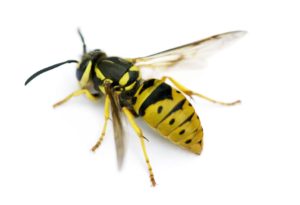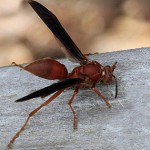Wasp Removal: Hornets, Yellow Jackets, and Wasps
Croach® wasp removal services are conducted by professionally-trained technicians with the equipment, materials, and knowledge to achieve results safely.
Do not attempt to eradicate, remove, or relocate a wasp nest on your own. Stay clear and use caution when working in your yard or otherwise enjoying the outdoors.
Note that honeybees are an essential part of our ecosystem and we do not exterminate them. When bee hive relocation is necessary, we can refer you to a local beekeeper.
Wasp Removal Services Near You
Get a Croach® pest exterminator near:
- Seattle (including Mukilteo, Sumner, Kirkland, Tacoma, Mount Vernon) and Tri-Cities, Washington.
- Spokane, Post Falls, Kooskia, Lewiston, and Boise, Idaho.
- Portland, Beaverton, Oregon.
- Denver, Aurora, Colorado.
- Columbia and Greenville, South Carolina.
- Charlotte, North Carolina
- Salt Lake City, Sandy, Utah.
How to Avoid Wasp Stings
 Wasps, Hornets, and Yellow Jackets can be particularly aggressive when they feel a threat to their nest, above or below ground.
Wasps, Hornets, and Yellow Jackets can be particularly aggressive when they feel a threat to their nest, above or below ground.
Avoid getting stung when enjoying the outdoors by following these tips:
- Wear light-colored clothing like white, khaki or beige. Bright colors attract wasps, and dark colors resemble their predators.
- Tight-fitting clothing is less accessible to wasps than loose-fitting shirts and pants.
- Eliminate the use of strong smells such as fragrant shampoo, perfumes or even chewing gum.
- Avoid swatting at a wasp. The movement makes it feel threatened. Stay calm and slowly, quietly move away.
Wasps Removal
 Yellow Jackets, Hornets, Mud Daubers and Paper Wasps are the most common types of wasps you'll encounter.
Yellow Jackets, Hornets, Mud Daubers and Paper Wasps are the most common types of wasps you'll encounter.
Wasps nests are often found on building overhangs, in walls or pipes, tree branches, attics, garages, and other high spaces.
But they are also known to build nests under your lawn furniture or in a crevice of your home.
Yellow Jackets prefer to conceal their nests underground or in the hollows of playground equipment or similar structures. In late summer and throughout the fall, Yellow Jackets become far more aggressive as they forage for a less available supply of food.
These wasps can sting multiple times if they feel their colony or survival is threatened. They may also swarm if you get too close to their nest or disturb it in some way. Some release a chemical when they sting that prompts others to sting as well.
If a colony of wasps is creating a perilous or disturbing situation, contact Croach® for professional and safe pest control and wasp removal services.
